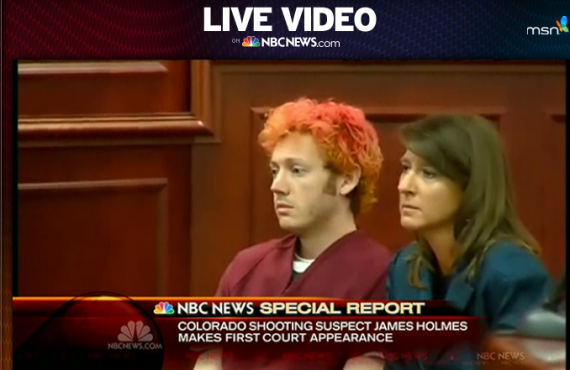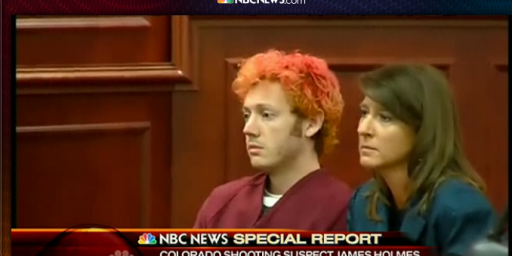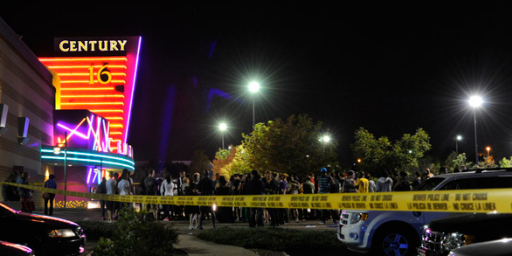Report: Psychiatrist Treating James Holmes Reported Him To Campus Police
ABC News is reporting that the University of Colorado psychiatrist who was treating James Holmes in a weeks before the movie theater shootings on July 20th had taken the extraordinary step of breaking doctor-patient privilege to report Holmes to campus police:
The psychiatrist who treated suspected movie-theater shooter James Holmes made contact with a University of Colorado police officer to express concerns about her patient’s behavior several weeks before Holmes’ alleged rampage, sources told ABC News.
The sources did not know what the officer approached by Dr. Lynne Fenton did with the information she passed along. They said, however, that the officer was recently interviewed, with an attorney present, by the Aurora Police Department as a part of the ongoing investigation of the shooting.
Fenton would have had to have serious concerns to break confidentiality with her patient to reach out to the police officer or others, the sources said. Under Colorado law, a psychiatrist can legally breach a pledge of confidentiality with a patient if he or she becomes aware of a serious and imminent threat that their patient might cause harm to others. Psychiatrists can also breach confidentiality if a court has ordered them to do so.
“For any physician to break doctor-patient confidentiality there would have to be an extremely good reason,” said Dr. Carol Bernstein, a psychiatrist at NYU Langone Medical Center and past president of the American Psychiatric Association.
This comes on top of last week’s news that Fenton had contacted members of the University’s Behavioral Evaluation and Threat Assessment team, but that matter was dropped after Holmes withdrew from school several weeks before the shooting incident. Whether this contact was part of the report to the BETA team or a separate notification is unclear but it seems to be another indication that Holmes was displaying serious mental problems in the months before July20th and it appears that the university dropped the matter after he left rather than pass the report on to, say, Aurora police authorities. Given the way our commitment laws work, it’s unlikely that anything could have been done to stop Holmes or get him into treatment before he went on his shooting spree, but it would be nice if someone had at least tried.
I’d expect to hear more about this. It’s going to be central to Holmes’s criminal trial and it suggests possible civil claims against the university for failing to follow up on Fenton’s reports.






This sort of thing shouldn’t be surprising. Pop culture super-villains to the contrary, seriously disturbed people are very, very, very bad at hiding their madness.
Mike
What is so extraordinay? I believe Colorado has a “duty to warn” law on the books.
Do a search for “Tarasoff duty”…
I don’t know if I would have called the CU police. They seem to be more like campus security guards rather than, you know, a law enforcement agency.
The most disturbing thing about this: While his shrink is sounding the alarm, UPS was delivering boxes of ammo to the guy’s apartment.
Even in the digital age, no one could have connected those dots, which is what makes it disturbing.
@anjin-san: The duty to warn should only apply to specific imminent threats of physical harm and should be directed to people in position to address the threat (the victim and law enforcement). There is something odd about the sequence of events here, particularly as Herb points out, why notify campus security?
@PD Shaw: At a lot of larger schools, campus police are an actual PD, not just a security unit, and have jurisdictional authority over activities on campus grounds. My educated guess is that CU is large enough to have a UCPD.
@Gromitt Gunn:
They do have a PD, but it’s a campus, not a city. It’s safe to assume they do not have the resources –even if they had the authority– to investigate a case like this.
@Gromitt Gunn: I’m more getting at the notion that a therapist should report to the law enforcement agency most appropriate for the identified threat. Reporting to campus police indicates a fairly localized concern limited to the campus. In other words, if Holmes had told his therapist he had an urge to shoot up a movie theatre in Aurora, you would expect the therapist to report it to the Aurora police. AFAIK, my wife has performed her Tarasoff duty twice in almost twenty years, and each time was to a different “level” of law enforcement.
Gun dealers should have access to the existing national prescription data base. They can ask if the buyer is taking anti-psychotic medication, if the answer is YES, the buyer will be denied the weapon. Problem solved.
@melvin polatnick: In Illinois, a therapist has a duty to warn the county sheriff if (a) a client expresses an interest in hurting himself or others, and (b) the therapist has actual knowledge that the client has one or more guns. The sheriff will show up shortly and confiscate the guns (unless the spouse has a FOID card).
But therapists don’t naturally know these things; they don’t have list in front of them, and IMHO we can’t turn therapists into a police detection arm of the government. The whole system works by people voluntarily coming to an appointment and trying to resolve their problems without threat of their property being taken or their person being institutionalized.
Here’s my question in all cases like this: What is it that the police department or other authorities were supposed to do with this information. We don’t have a Department of Pre-Crime. Until someone commits a criminal violation, there’s usually not a damned thing we can do about suspicions that they may commit a crime. Certainly, we don’t have the resources to follow every crazy person around just in case.
@melvin polatnick: AFAIK, there is no national prescription database. There is only NASPER, which is very far from a national prescription database.
I am actually a bit nervous about non-medical personnel being able to check up on our prescriptions. And concerned that, if we don’t let someone who is getting medication get guns, what else will we not let them do? (We don’t exactly have progressive attitudes towards those seeking help for mental/emotional issues.)
And, if we don’t let them do things, and if they know others may have access to their personal information, what effect will that have on people seeking help?
And beyond that, a lot of people who are on anti-psych medications are not doing what Holmes did.
@James Joyner: I think the classic case of a therapist warning law enforcement is someone who has become dangerously obsessed with an individual, so law enforcement is warned so that they can take practical precautions (it probably helps if there is a restraining order), including warning the victim.
The individual can tell the therapist he/she intend to commit violence at a specific place, but one suspects that they want to be caught and want help. Law enforcement will be there waiting.
I don’t think a therapist is a likely initiator of civil commitment proceedings without outside aide from family or friends or teachers.
Neo-neocon wrote a blog post (and some interesting comments) based upon her experiences as a therapist. Link It references the standards for civil commitment in Colorado.
@James Joyner:
At minimum, when told by some one who should know, subject is dangerous, an officer needs to do records checks, talk with his street sources, then make contact (all which could be done to the ride to the home) and then let events unfold. Might be able to talk his way in the home, might not, might talk the subject into a trip to the hospital, might be able to build a case for 72 hr psych admit (if state law, resources permit), might be able to build a case for say a disorderly conduct arrest, overnight in jail leading to same, might find family and neighbors are aware of the problem and keeping the subject controlled. Of course, the officer’s presence could set the subject off and everything goes up in a ball of flame, SWAT team, etc. Much depends on the skills and creativity of the officer. Also the resources available to an officer in Jackson, MS are probably much better than those of a deputy in Holden Crossroads, MS.
A example might be recent case in San Francisco. Arms confiscated, 72 hour psych admit, discharge, second arrest, second arsenal and marijuana confiscated. From the article, good solid police work but also shows the flaws.
To other points, if the uni police did the off campus not our problem line they like to use, somebody’s going down hard. Maybe we can see some state/federal legislation to address the problem.
@James Joyner:
Of course, what SHOULD happen is that it should be unlawful to sell such weaponry and ammunition to a person who takes anti-psychotic drugs or who generates a warning report from a psychiatrist. What WILL happen is that the NRA will steadfastly and successfully oppose any attempt to pass such legislation.
@PD Shaw: I see what you’re saying now. It was the term ‘campus security’ that sent me in a wrong direction.
Another interesting sidenote to this is the person(s) who have already filed lawsuits that name “Holmes’ psychiatrist (if any)” as a defendent. Their case is getting weaker by the day, considering her actions reported thus far.
@stonetools: Thought you might want to know that there are many anti-psychotic drugs that are used to treat unrelated conditions. Wonder drugs that treat multiple illnesses are all the rage. I used to take Depakote daily for migraine prevention but if you look it up you’d quickly see that it is used for a lot more then just migraines. In the future do try to learn a little about a subject before making such a declaration when it results in the restrictions of the rights for others. Thanks.
i just hope no lawyers are injured rushing to sue the school/movie theater/gun maker/orange hair color manufacturer…..